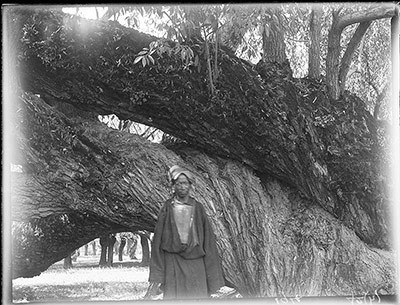
1998.286.207.1 (Glass negative)


1998.286.207.1 (Glass negative)

Sir Charles Bell or Rabden Lepcha?
Sir Charles Bell
1920-1921
Lhasa > Jara Lingka
1998.286.207.1
78 x 103
Negative Quarter Plate
Donated 1983
St Antony's College, Oxford
Lantern
Sir Charles Bell's Mission to Lhasa 1920-21
Q.194
BL.Q.194
British Library, Oriental and India Office Collections
Manual Catalogues - Bell's List of Illustrations entry: "[No. of chapter] XLII. [Subject of Chapter] The Flora [Subject of Illustration] Q194 (h). Two giant willows in the Jara Lingka, near Lhasa. A pair of the largest willows in Lhasa and perhaps the largest in Central Tibet. They are very old. One has a girth of 25ft near the root and of 13ft at a distance of 8ft from the root after it has been divided into trunks. [Remarks] L.214"
Other Information - Setting: Bell's diary for 29th July 1921:" Lhack-cho orderly, one of my Tibetan orderlies, calls the weeping willow "Sorrow Tree" ( Nyan-gen shing ). Many of the people believe that when the 5th D[alai] L[ama] died, the branches of the weeping willows bent down and have bent down ever since. Formerly they stood up." [Diary Vol. XI, p.64]
Other Information - Related Images: The trees visible in 1998.286.208 and 1998.286.207.1&2 are both derived from the same root [MS 03/03/2006]
For Citation use:
The Tibet Album.
"Willows in Jara Lingka, Lhasa"
05 Dec. 2006. The Pitt Rivers Museum.
<http://tibet.prm.ox.ac.uk/photo_1998.286.207.1.html>.
For more information about photographic usage or to order prints, please visit the The Pitt Rivers Museum.
© The Pitt Rivers Museum